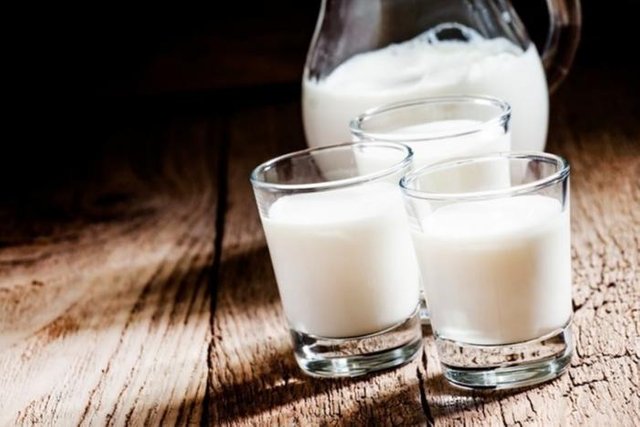Milk and its Benefits.
Milk is a liquid produced by human mammals and mammals. It contains a large number of nutrients necessary for the growth and development of the body. Milk includes fats, proteins, vitamins and trace elements. The color of the milk may vary from white to yellow-blue. It depends on your fat. Due to the lactose content, it has a slight sweet taste. Milk includes more than 100 useful components, of which about 20 balanced and fatty amino acids, lactose, minerals.
Milk is one of the first products that began to produce ancient settlements of people after the domestication of animals. Depending on the traditions of the peoples and historical preferences, the milk of goats, cows, camels, donkeys, buffalo, sheep, zebras, female deer, yaks and even pigs are used for food.
The protein contained in milk is very well absorbed, and the nutritional value of a liter of cow's milk can be compared with 500 grams of meat. It also contains a daily dose of calcium. In cases of intolerance to cow's milk, doctors recommend eating goat.
Goat milk is most used to produce yogurt, butter, cheese, kefir, ice cream and is added to chocolate. Due to the need for greater animal care and less milk, this type of milk is used less for factory production. Also compared to cow goat milk has a specific smell and taste, which is formed from the sebaceous glands of the udder. The main characteristic of goat's milk is the uniform distribution of the cream throughout the volume.
The milk of horses in terms of fat is much lower than that of cows and has a blue tint. The composition of mare's milk is very similar to human milk, so it is used to make some infant formulas for artificial feeding.
Buffalo milk is used for the preparation of dairy products, in particular mozzarella cheese. This type of milk contains almost no goat, but it contains more, compared to the cow, the amount of protein, fat, minerals and vitamins.
Camel milk contains vitamins C and D, which are three times more than in cow's milk.
Sheep's milk contains vitamins from milk B1, B2 and A, which are more than in cows 2-3 times. It is made of kefir, sourdough, cheese and butter.
Donkey milk is quite rare and expensive, because one day the donkey gives milk no more than two liters.
Deer milk, compared to cow's milk, contains more protein (3 times) and fat (5 times). Not accustomed to this type of milk is very difficult to digest, so it is recommended to dilute with water.
The medicinal properties of milk have been known for a long time. It was used to breastfeed weakened and emaciated patients, as well as in a set of medical interventions for lung diseases, tuberculosis and bronchitis.
Milk is a unique product that contains a wide variety of vitamins, trace elements, proteins, enzymes, lactic acids. Contained in milk, globulins, casein and albomin are antibiotic substances, so milk has bactericidal properties, prevents the development of infections in the body, strengthens the immune system.
Micronutrients are responsible for the normal development of all body cells, especially the health of hair, teeth, nails and skin. Saturated acids regulate the activity of the nervous system. In particular, milk has a calming effect and it is recommended to drink before bedtime as prevention of insomnia and manifestations of depression. Lactose is responsible for the proper work of the intestines, prevents rotting processes, the growth of harmful microflora. Lactose also helps improve calcium absorption.
Milk due to the high fat and protein content perfectly restores strength after physical and mental exertion. Potassium, calcium and vitamin B12 have a beneficial effect on the cardiovascular system and regulate metabolic processes. Milk-based medicinal herbs give away their nutrients better and are easier to digest. Milk is often used as a dietary product in diets, particularly dairy.
Regardless of the type of milk is used in the treatment of colds, flu and sore throat. A glass of warm milk with honey and butter perfectly heats the sore throat, softens the cough and improves sputum output.
The amino acid lysocyte in milk has healing properties, so it is indicated in diseases of the gastrointestinal disease. Also, milk is prescribed for increased heartburn and chronic heartburn.
Milk is often used in the preparation of various types of facial masks. Nourishes the skin, relieves inflammation and irritation.
In the kitchen, milk is used for sauces, cereals, pastries, marinades, cocktails, drinks with coffee and other dishes.

I adore milk but the sad truth is that I have a severe diarrhoea every time I drink it. Who knows, may be I am lactose intolerant?! But I can't stop it... :(